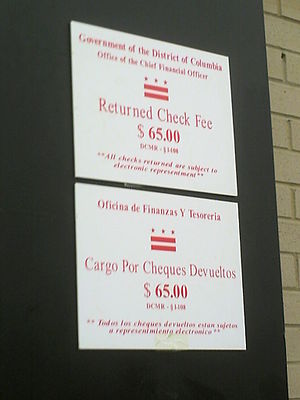Non-sufficient funds (NSF) checks cost practices time and money. A NSF check (also called a bad check, a bounced check, or a returned check) is one that a patient gives you, you deposit and the bank returns to you because the account is closed or does not have sufficient funds to cover the check. A written NSF check protocol ensures that staff can process the check and collect the money owed in a businesslike manner, spending a minimum of time and money.

Image via Wikipedia
- Contact your bank and ask what their NSF check practices are so you can develop your policy appropriately. Find out the bank’s charge to the practice for depositing a bad check, and if the bank attempts to collect the money from the patient’s account more than once before returning it to you. If they try to collect twice, you may choose not to deposit the check again.
- Post signs in your practice (usually at check-in and/or check-out) to let patients know what your returned check fee is. You may charge exactly what the bank charges you or you may charge an additional fee for the work it takes your staff to collect the NSF check.
- Note that some collection bureaus or third-party collectors will process NSF checks for you. You and the agency will determine the cost above the bank fee of the NSF check processing and this additional fee will either belong to the agency, or the two of you will split it.
- You may send the check through a second time after calling the patient’s bank to see if there is money in the account.
- Post the adjustment to the patient’s account showing the returned check amount and post the returned check fee as a charge.
- Call the patient to request that they come to the practice and exchange their NSF check for cash or a money order – the total owed will be the amount of the check plus the returned check fee.
- If you cannot reach the patient by phone, send a certified letter with a copy of the check (see sample verbiage below.) Do not return the bounced check to the patient until they have paid the amount due (for the check and the bank charge) in full. Keep a copy of the letter and check in your bad check file. In the letter, let the patient know if there is any repercussion to them if they do not make the check “whole” and require that they respond with a certain number of days.
- Once a patient passes a bad check, only accept cash or money orders from the patient going forward. Place a pop-up alert in your computer system to this effect so check-in and check-out staff collect appropriately.
- If the patient does not satisfy their bad check, you may choose not to see the patient again, however if your practice provides urgent services, do not turn the patient away for urgent services due to an unpaid bill. You can refuse service once you discharge the patient with a 30-day notice, and provide the patient with 30 days of emergency-only care.
- There are check authorization services that confirm whether or not the check is good at the time you take it. You can also verify checks that come in the mail, and if not good, you can contact the patient immediately and avoid the bank fee. What you decide to charge the patient in this case is up to you, but collecting a standard bad check fee for any NSF check will help defray the costs of the check authorization service.
- Some practices do not accept checks. The number of people paying by check are dwindling, while more people are opting to pay by credit or debit card. Some practices are keeping credit cards on file for all fees owed by the patient which is not only convenient, but you can process the transaction and tell immediately if money is available to cover the transaction.
- Check your state law for NSF check laws to confirm the number of days to give the patient to cover the returned check and what other means of collecting the money are available to you.
- A few related notes: (a) Most practices collecting large sums of money will require patients to pay in cash, by cashier’s check or money order before the service is rendered so as not to risk the possibility of a bounced check. (b) It is not recommended that you accept checks dated for any date except the actual transaction date. (c) Never accept a check where the patient has written “Paid in Full” unless the account is well and truly paid in full. (d) Never let the patient overwrite a check and get change from the practice, or cash a check for a patient.
Sample Returned Check Letter
Date: _____________________
To:
Dear _______________:
Your check number ______ in the amount of $_________________, dated ___________________, has been returned by the bank. We have verified with your bank that there are insufficient funds to pay the check.
Please replace this check with cash or a money order and pay the bank charge for a total of _______ within ___ days to avoid further collection action.
If you have questions about this, please contact _________ at ________ between the hours of _________.
Sincerely,
Practice Name

